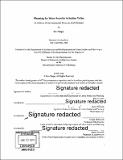Planning for water scarcity in Jordan Valley : in defense of environmental flows in arid climates
Author(s)
Tolgay, Sera
DownloadFull printable version (29.92Mb)
Alternative title
Defense of environmental flows in arid climates
Other Contributors
Massachusetts Institute of Technology. Department of Architecture.
Advisor
.
Terms of use
Metadata
Show full item recordAbstract
Scarcity is relative, as water resources can be mismanaged, shared inequitably and allocated asymmetrically. Half a billion people live under conditions of severe water scarcity in many arid and semi-arid regions, marked by an increasing demand for water and unprecedented droughts.' The Jordan River basin, a peri-urban regional corridor, is in a particularly water-stressed region with worldwide lows in per capita water availability that is projected to decrease further by 20 percent by 2050.2 Both the valley's communities, especially smallholders, and fragile habitats of the watershed will be hard hit by the impact of a drying climate. The collapse of Jordan River, which has seen its flow reduced to a small fragment, and decline of the Dead Sea downstream are flagged as ecological disasters. However, beyond being merely a physical constraint or a supply issue, the problem of scarcity is also shaped by the politics of allocation. Through layers of geospatial data, from archival maps, surveys and remote sensing data, I show how the history of land resettlement, water allocation and infrastructural development can complicate restoration efforts today. The Regional NGO Master Plan, drafted by experts from Israel, Jordan and Palestine, makes the case for the need to rehabilitate Jordan River by allocating 400 MCM, a third of pre-modern levels, as the required inflow for restoration. I argue that restoring the river goes beyond direct flows and should be defined to include critical ecosystems that affect the hydrological cycle of the entire basin, including buffer systems and conservation reserves that support local communities. In the absence of fair reallocation mechanisms and regional design at the scale of the watershed, a roadmap to establishing common environmental flows is infeasible. Rather than offering a utopian vision for the rehabilitation of Jordan River, as an addendum to the masterplan, I develop six geospatial propositions in defense of establishing environmental flows in contexts of scarcity.
Description
Thesis: M.C.P., Massachusetts Institute of Technology, Department of Urban Studies and Planning, 2018. Thesis: S.M., Massachusetts Institute of Technology, Department of Architecture, 2018. "June 2018." Cataloged from PDF version of thesis. Includes bibliographical references (pages 97-101).
Date issued
2018Department
Massachusetts Institute of Technology. Department of Architecture; Massachusetts Institute of Technology. Department of Urban Studies and PlanningPublisher
Massachusetts Institute of Technology
Keywords
Urban Studies and Planning., Architecture.